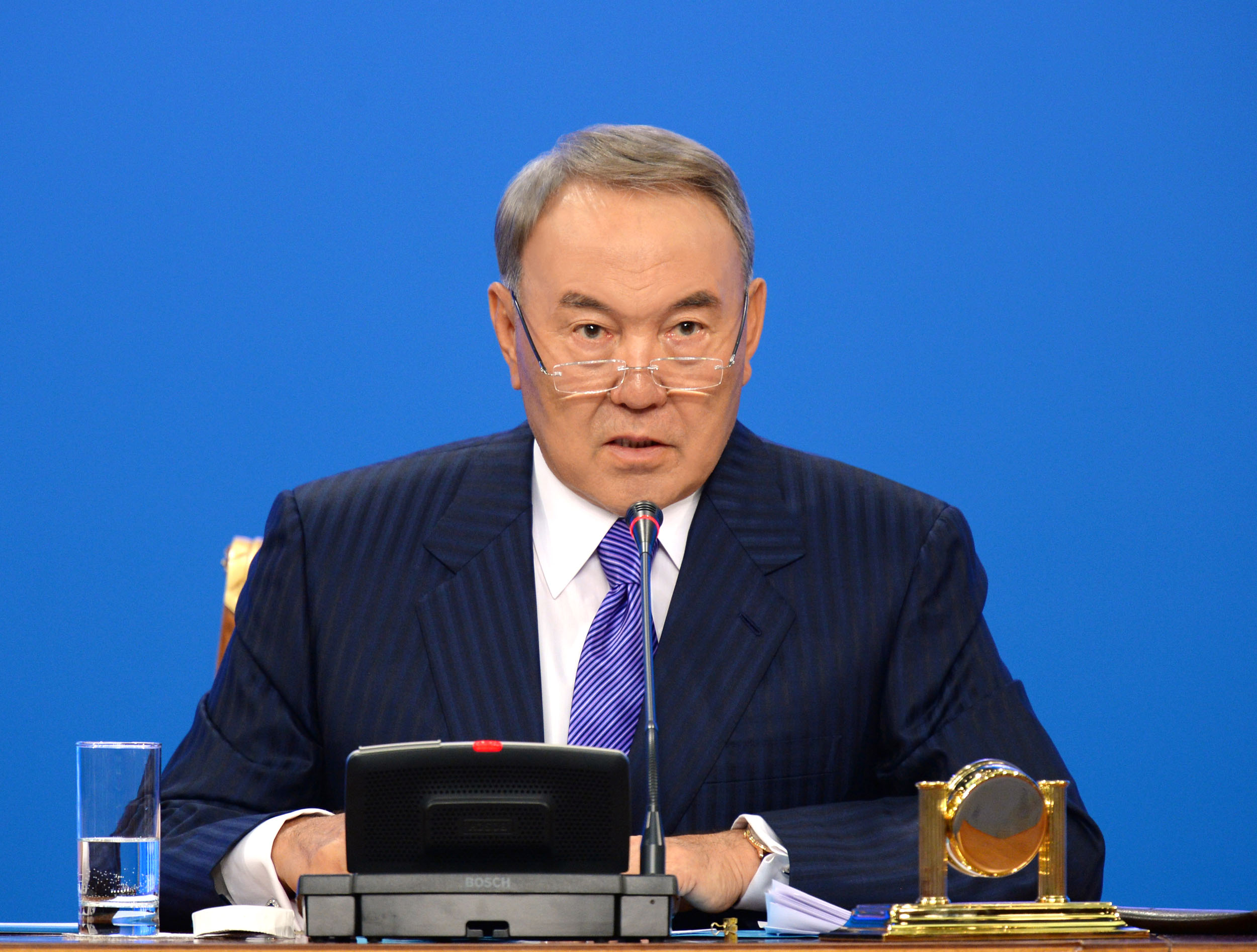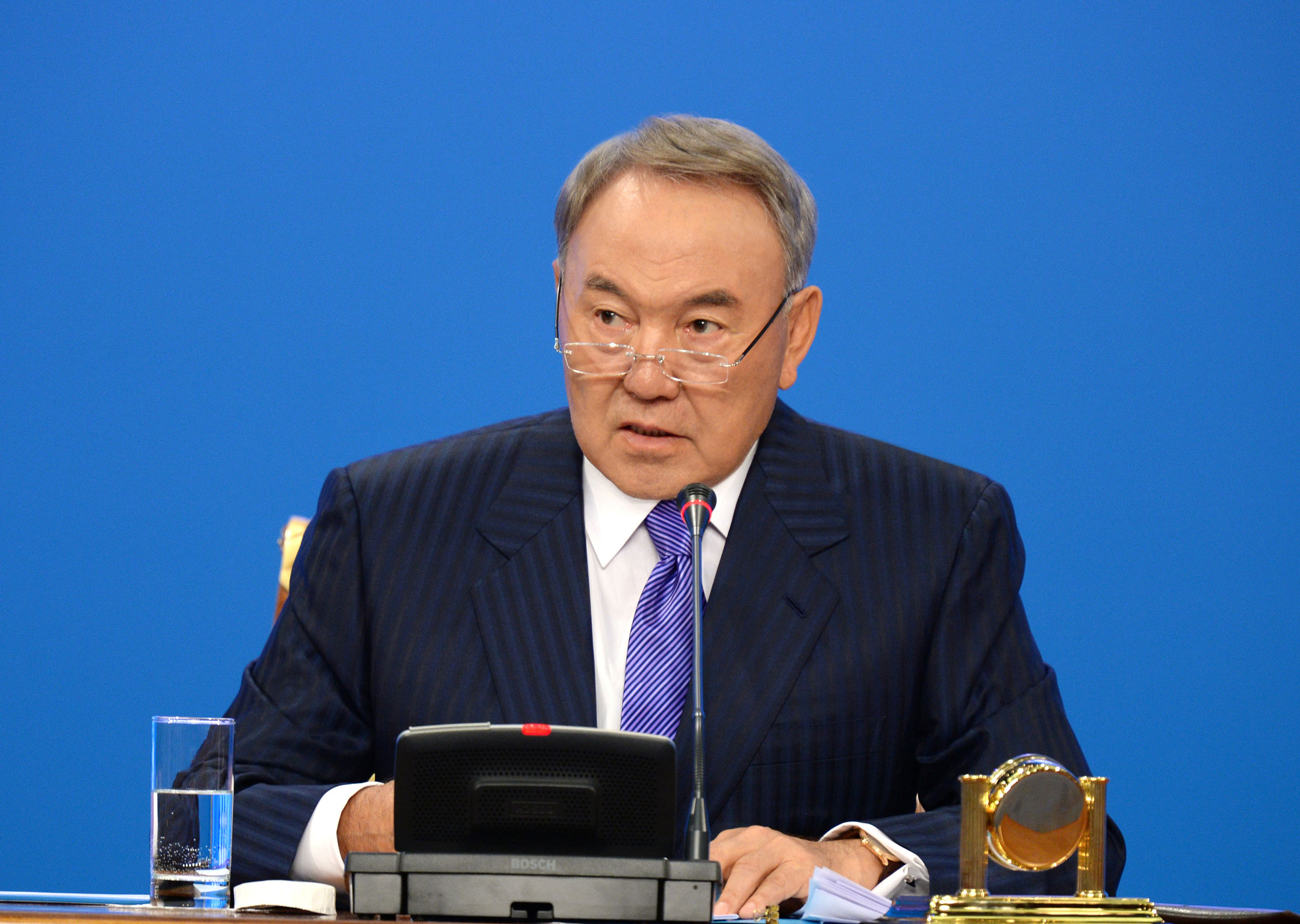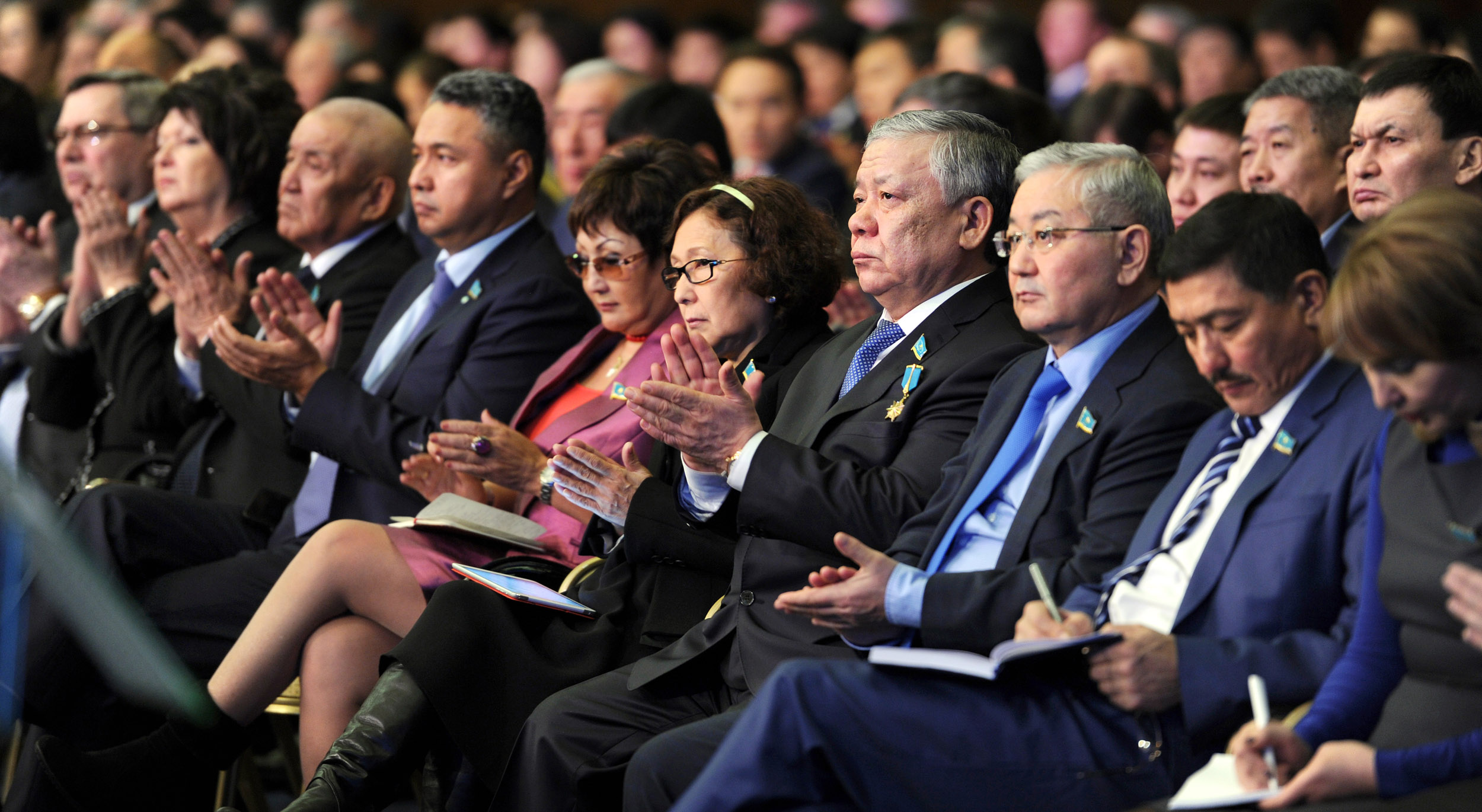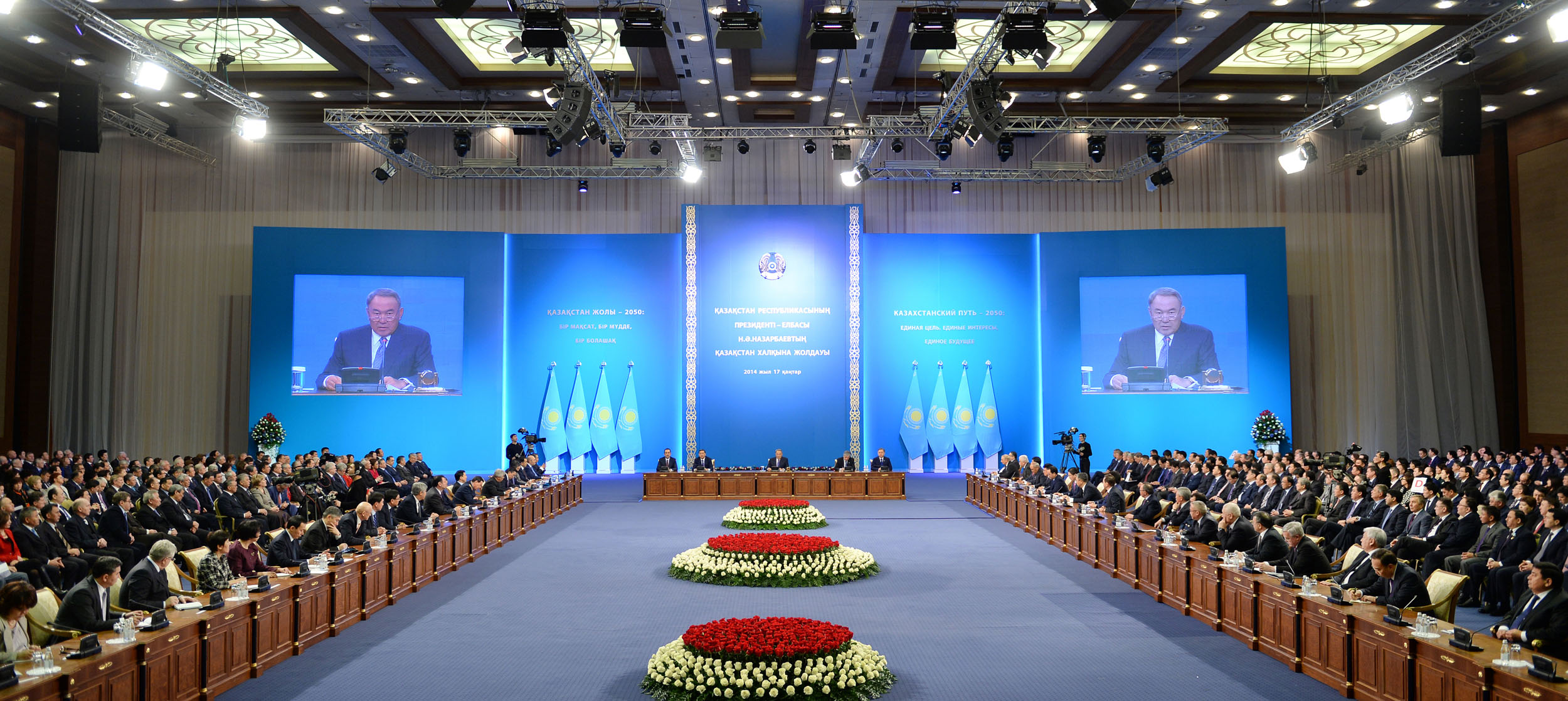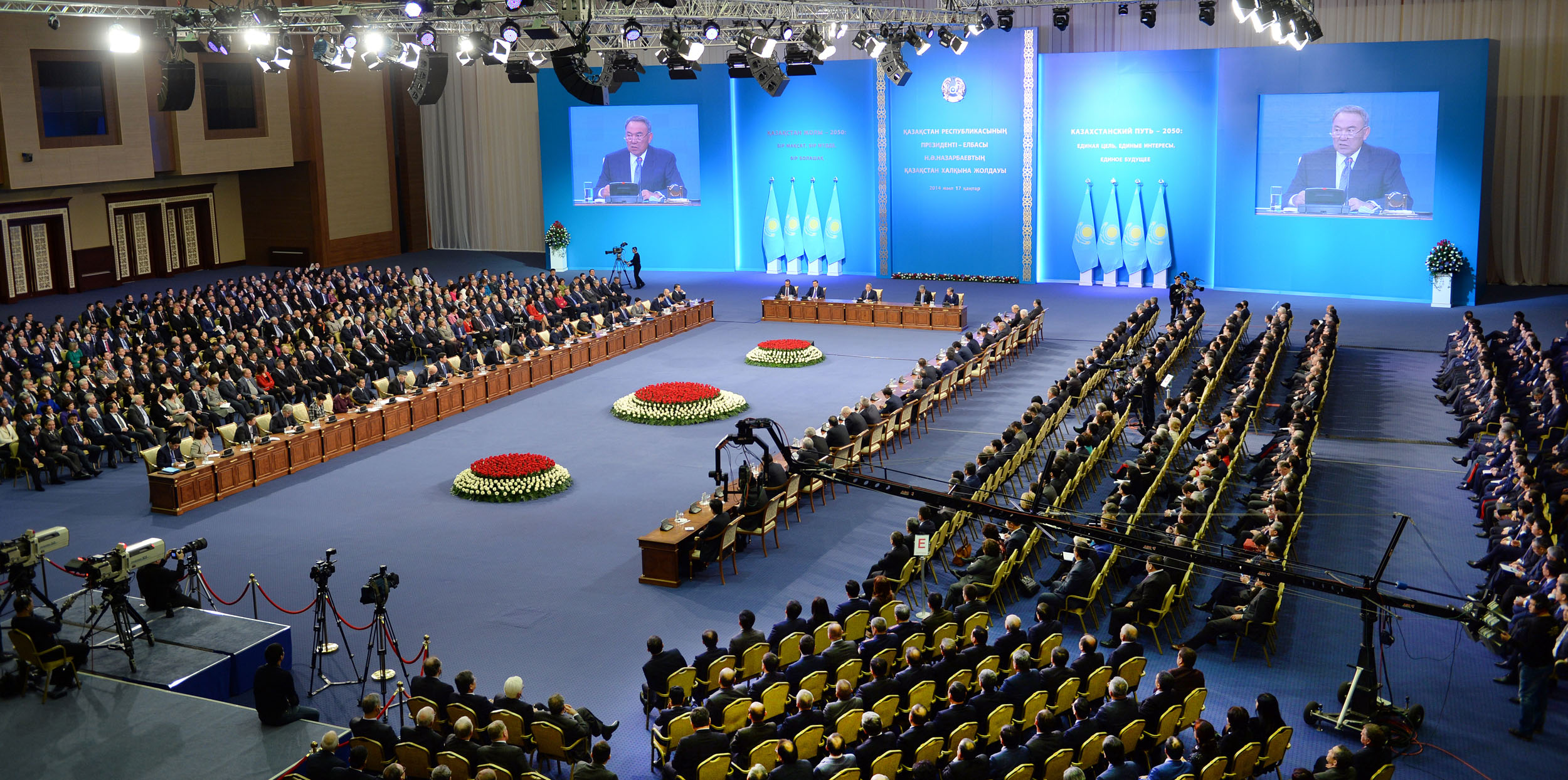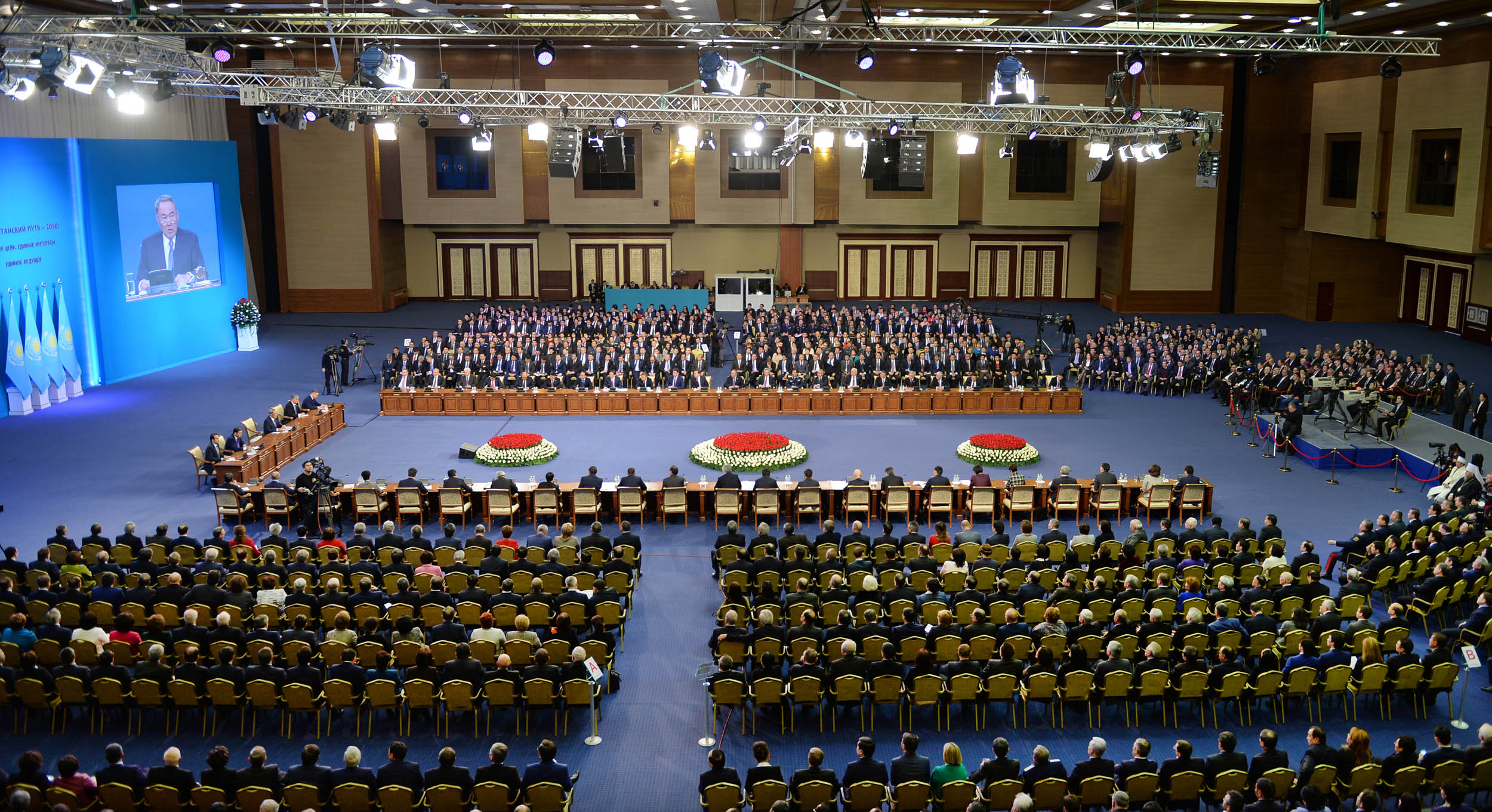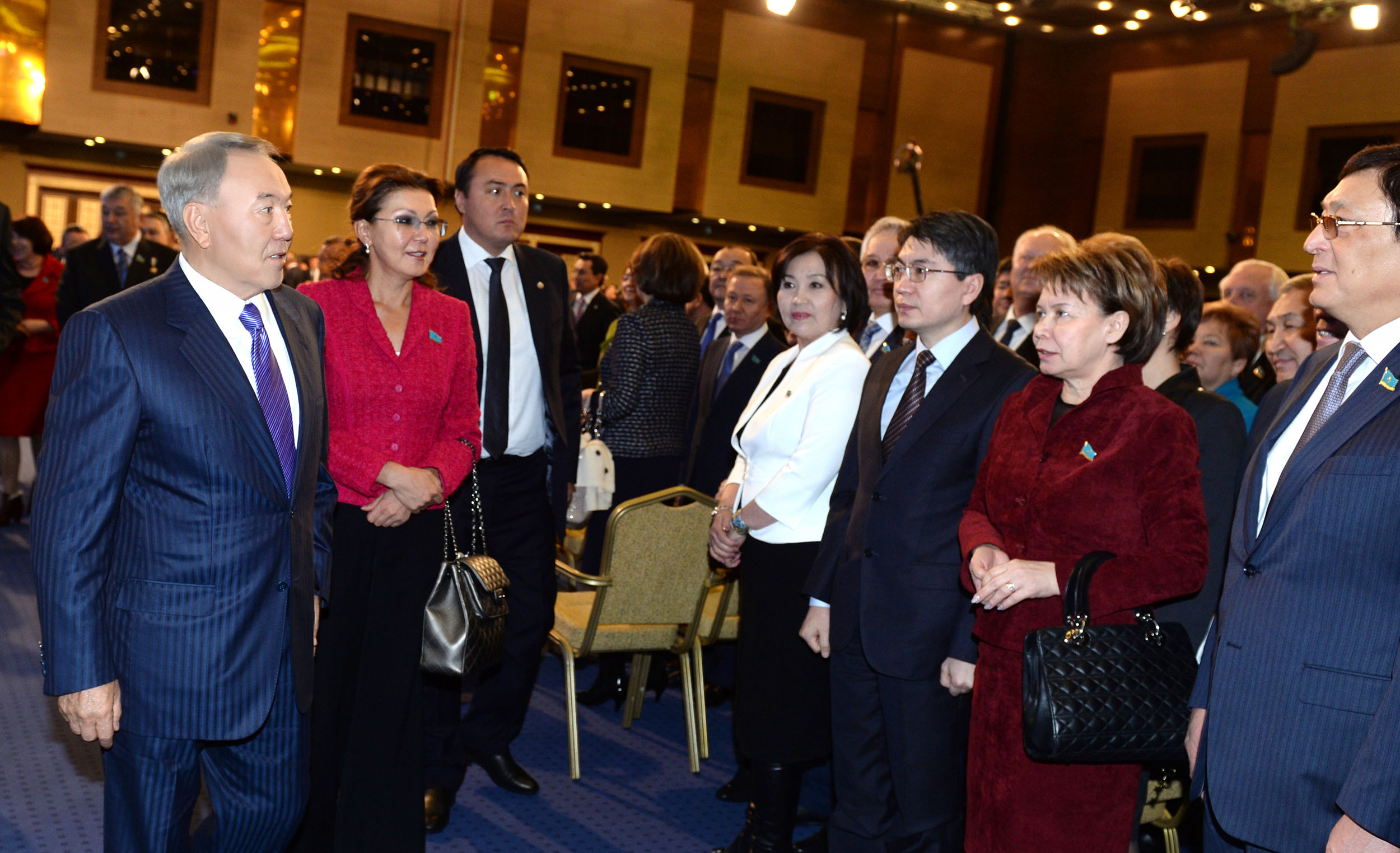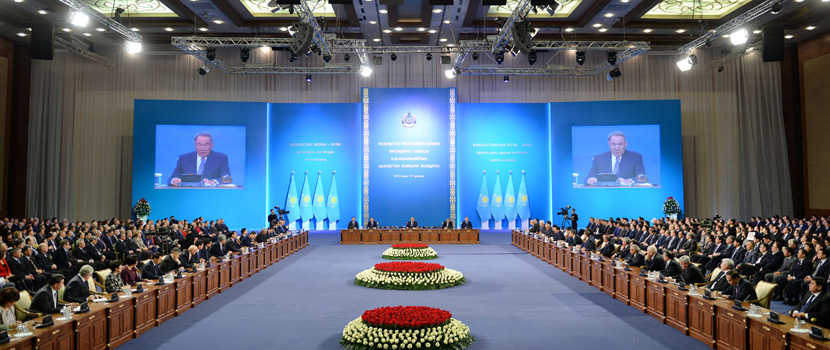Kazakhstan’s way – 2050:
common aim, common interests, common future
Dear fellow citizens!
Distinguished Members of Parliament!
A year ago I announced the new political course for Kazakhstan until 2050.The main goal is to join the group of 30 most developed countries.This project is called “Eternal Kazakhstan”. It is a mature vision of a new era in the history of our country.
Over the last 22 years Kazakhstan has accomplished a great deal. We have created our own successful model of development. Every citizen is immensely proud of their country. They have faith in tomorrow and believe in the future of Kazakhstan. 97 percent of our citizens recognize the stability of their social-economic condition and its continuous improvement year to year.
Today the achievements of our country are the national pride of every citizen. Strong and powerful countries are formed on long-term vision and stable economic development. Strategy “Kazakhstan - 2050” is a modernization path for all areas to provide sustainable growth. It is a big challenge, which will test and strengthen our country, our unity, our courage and our efforts. Our common duty and responsibility is to implement the strategy flawlessly and overcome this test without failures!
Dear fellow citizens!
Kazakhstan of the 21st century is a country created from scratch in just two decades by talented, hardworking and tolerant people! This is our creation in which we take huge pride! It is our great creation that we wholeheartedly love!
We’ve adopted Strategy-2050 so that Kazakhstan’s people can hold firmly in their hands the helm of the country's future. Today, many successful countries – China, Malaysia and Turkey – follow their long-term strategies. Strategic planning is a ‘number one’ rule in the 21st century, because no wind will be favorable unless a country does not know its route and destination harbor. Strategy “Kazakhstan 2050”, as a guiding beacon, allows us to solve our people’s everyday issues, while also keeping our priority aims in mind. This means that we should improve the life of our nation not in 30 or 50 years’ time, but do so every year.
The Strategy is a program of concrete practical actions, which on a daily basis will improve our country and the life of every citizen of Kazakhstan. However, everyone must understand that, in market conditions, we must work effectively, rather than wait for “manna from heaven”. The government’s task is to provide all conditions for this.
I am convinced that the prosperous future of our homeland lies among developed countries. Achieving this ambition will unite the people of Kazakhstan forever.
Today, I want to present our plan for joining the 30 most developed countries of the world. On my instruction, the Government has drafted a detailed plan for Kazakhstan to take its place among the top 30 countries. I gave my overall endorsement to this document, which will be finally approved after revision to fit my instructions in this Address.
According to many forecasts, the next 15-17 years will be a “window of opportunity” for large-scale breakthrough development of Kazakhstan.
During this period, we will have a favorable external environment, rising demand for resources, energy and food, and the growth of the Third Industrial Revolution.We should make benefit of this time.
The process of achieving the goals for 2050 will proceed against the background of intense global competition. Forthcoming decades will bring many well-known challenges, as well as numerous unexpected situations, new crises in global markets and world politics. There will be no “easy ride” in the 21st century. The middle of the century is already not too distant. Developed countries take this into account in their specific strategies. The second third of the 21st century will definitely be more difficult, and the number of candidates to the global list of top 30 will be very limited. I have repeatedly noted that the concept of a “developed country” is a category that changes over time. In developed countries, we see fundamentally new qualities in the life of people.
Today the member states of the Organization for Economic Cooperation and Development (OECD) represent basic indicators of developed countries. This organization brings together 34 countries that produce more than 60 percent of global GDP. There are six more candidates to join the OECD: Brazil, China, India, Indonesia, Russia and South Africa. The OECD member countries have undergone the path of deep modernization. They now demonstrate high rates of investment, scientific research, productivity, a large share of small and medium-sized businesses, and high standards of living. These indicators of OECD countries provide a natural benchmark for Kazakhstan on our way to joining the top 30 developed nations of the world.
I set the task to introduce in Kazakhstan a number of principles and standards of the OECD. They are reflected in the draft Plan. In our economy, we plan to reach annual GDP growth not less than four percent. We should increase the volume of investment from the current 18 percent of the country’s GDP to 30 percent. The development of knowledge-based economy aims to see the share of non-oil products in Kazakhstan's export potential rise to 70 percent.
The development of new high-tech sectors of the economy will require increase in financing of science to the minimum level of 3 percent of GDP. It is necessary to halve the energy intensity of the GDP. By 2050, small and medium-sized businesses will produce at least 50 percent of Kazakhstan's GDP, instead of the current 20 percent. Labor productivity should grow five-fold, from the current $24,500 to $126,000.
The main benchmarks of the SOCIAL SECTOR development until 2050 are provided in concrete indicators. We should increase by 4.5 times our GDP per capita, from $13,000 to $60,000. Kazakhstan will become a country where the middle class makes up a predominant share of the population. Following the global trend, the share of our urban population will increase from the current 55 percent to roughly 70 percent. The cities and settlements of Kazakhstan will be linked by high-quality roads and high-speed transport.
The maintenance of a healthy lifestyle, and advances in medicine will help increase the life expectancy in Kazakhstan to 80 years and above. Kazakhstan will become one of the leading Eurasian centers of medical tourism. The building of an advanced and competitive national educational system will be completed. Kazakhstan has to become one of the most SAFE AND COMFORTABLE COUNTRIES FOR LIVING. Peace and stability, justice and rule of law are the basis of a developed country.
Fellow citizens!
Our Plan for Kazakhstan joining the top 30 developed countries of the world includes long-term priorities for our activity. It requires us to address a number of challenges in the following priority areas.
FIRST. It is important to adjust and strengthen the trend of innovative industrialization. I gave instructions to the Government to design a draft of the Second Five-Year Plan for Accelerated Industrial and Innovative Development for 2016-2019. We need to limit the number of priorities for industrialization.
It is important to increase the effectiveness of traditional mining sectors. They are our natural competitive advantage. We need to adopt new approaches to the management, production and processing of hydrocarbons, to maximize the export potential of the energy sector. We need to make final decisions on possible future scenarios for oil and gas production. It is important to increase the development of rare earth metals, taking into account their importance for knowledge-based industries – electronics, laser technology, telecommunications and medical equipment.
Kazakhstan should enter the world market of geological exploration. We need to attract investment from foreign engineering companies to this industry by simplifying legislation. In general, we should have separate plans for the development of traditional industries. Each of the next five-year plans should end up with an emergence of new industries in our economy. During the first five-year plan, we developed production capability in the automotive and aircraft industries, as well as locomotives, passenger and freight car production. We should expand these products and export them to external markets.
So, the remaining years until 2050 are divided into seven five-year periods, each aimed at achieving the goal of becoming one of top 30 developed countries.
During the second and subsequent five-year plans, we should establish the industries of mobile and multimedia technology, nanotechnology and space technology, robotics, genetic engineering, and future energy exploration. The key priority of the Government’s work is to create most favorable conditions for Kazakhstan's business, mainly small and medium-sized enterprises. In the next 10-15 years, it is necessary to develop a knowledge-intensive basis for the economy. Without this basis we cannot join the group of developed countries. And it must be founded on advanced science.
SECOND. We need to ensure that our AGRICULTURE takes the path of innovations. This is our traditional industry. The global demand for food will increase. This sector will attract more investment. This will enable farmers to look beyond short-term weather-related achievements to the long-term growth of production. Competition in the global agro-production will intensify. Agricultural lands should be used by those who introduce new technologies, continuously improve productivity, and perform on the basis of the best international standards.
First and foremost, it is important to develop an effective land market, particularly through transparent pricing mechanisms. Once investment and introduction of advanced technologies become pre-requisites for farmland leasing, it will increase competition. We should remove all barriers that impede business development in agriculture, farmers’ cooperation and efficient land use.
The future lies in the creation of a network of new processing enterprises in the agricultural sector, mainly in the form of small and medium-sized businesses. In this area we should provide loans to business. Farmers should have direct access to long-term financing and markets without intermediaries. Also important is the creation of an effective system of guarantees and insurance of loans to rural producers. Kazakhstan should become a major regional exporter of meat, dairy and farming products. In crop farming, we should reduce the volume of unprofitable water-intensive crops cultivation and switch to vegetable, oilseed and forage production. We need a set of measures to drive the efficient use of agrochemicals, and increased use of modern technology of zero tillage and other innovations in arid regions.
According to the Plan for the transition to the “green” economy by 2030, 15 percent of acreage will be converted to water-saving technologies. We need to develop agricultural science and create experimental agro-innovation clusters. It is important to keep up with the pace of time, and along with the production of natural food, develop drought-tolerant, genetically modified crops. Given the designated tasks, I charge the Government to adjust the planning for agriculture development.
THIRD. The development of knowledge-based economy is, above all, the increase of the capacity of science in Kazakhstan. In this area we should improve legislation on venture financing, intellectual property protection, research and innovation support, as well as commercialization of research. I charge the Government before September 1 of this year to develop and submit to the Parliament a package of relevant bills. We need a concrete plan for the gradual increase of science financing for specific research and scientific discoveries. These are essential to the country and we need to bring them to the level of developed countries.
To accelerate the transfer of knowledge and new technologies to the country, we need to fully use the potential of foreign direct investment. In cooperation with foreign companies we need to set up design and engineering centers. We need to invite the leading transnational companies operating in major oil and gas and mining facilities to establish production facilities for their own needs and services here, in Kazakhstan. I know some large companies are ready for this. The Government must elaborate on this issue and provide favorable conditions for the process if necessary. There is no need to import equipment from abroad, if we can produce it in our country.
It is important to improve the efficiency of the national innovation system and its basic institutions. Their activities should be oriented to supporting start-ups and venture deals at early stages. It is necessary to increase activity in technology parks, mainly in large urban agglomerations, primarily in Astana and Almaty. In Astana, the first intellectual innovation cluster is already successfully operating around Nazarbayev University. In Almaty there is an “Alatau” Information Technology Park. We need to think about bringing spin-off production sites of large local companies into the clusters.
FOURTH. We have to ensure dynamic development of the infrastructure triad — AGGLOMERATIONS, TRANSPORTATION, AND ENERGY. Agglomerations are the foundation of the knowledge-based economy of Kazakhstan. Their creation and development are an important challenge given the vast territory of our country and its low population density. The largest cities of Kazakhstan, Astana and Almaty, Shymkent and Aktobe must become contemporary urban centers driving economic growth. They should become centers of science and investment, attract talent, and provide high-quality education, healthcare, social, and cultural services.
Transport infrastructure is at the heart of industrial economy and society. I have said many times that it is impossible to reach the level of a developed country without modern high-quality highways. As we are located between Europe and Asia, between the North and the South, transportation remains of great importance to Kazakhstan. To set up a network of internal roads, we have initiated construction of highways “Astana-Karaganda-Almaty”, “Astana-Pavlodar-Ust’-Kamenogorsk”, “Almaty-Kapchagay-Ust-Kamenogorsk”. These routes are already used by trains that are twice as fast.
We need to develop the logistics services sector. First of all, it is a question of the maximum use of the Customs Union territory for transportation of our goods. The construction works of the “Western Europe – Western China” corridor are coming to an end. We have built a new railway to Turkmenistan and Iran with an access to the Persian Gulf. In the future, Kazakhstan must invest in the creation of logistics centers in countries with access to the sea. It is necessary to reduce the customs clearance time for goods, increase the capacity of border checkpoints, strengthen the efficiency of the Aktau seaport, and simplify exporting and importing procedures.
We are constructing the new 1200 km long railway Zhezkazghan – Shalkar – Beineu. This railway will connect the country’s west and east, reviving activities in the regional centers. This grand construction is to be completed in 2015. These routes will enable us, through the Caspian Sea and the Caucasus, to reach Europe and, in the East, the Lianyungang seaport bordering the Pacific Ocean, upon which there is an agreement with the People’s Republic of China.
We are going to develop the traditional energy sector. It is necessary to support research in cleaning fossil-fuel power plants’ emissions and in energy saving, in industry and household, based on the most sophisticated technologies. Recently, ten largest companies of the European Union publicly opposed the EU energy strategy based on the well-known concept of the green economy. Over the four years of its implementation, the European Union has lost 51 gigawatt of energy power. In our green energy program, we have to take into account all of these mistakes.
Preparation for the international exhibition EXPO 2017 in Astana should be used to establish a center for the study and implementation of the world’s best research and the creation of future energy. A team of specialists, under the auspices of Nazarbayev University, should lead this work. We should create conditions for the transition of our public transport to environmentally friendly fuels, introduce electric cars, and create the necessary infrastructure for them. The country needs large-scale production of gasoline, diesel fuel, and aviation kerosene. We need to construct a new oil-processing refinery.
At the same time, we should not forget about development of nuclear energy. The demand for cheap nuclear energy, in the foreseeable future, will only increase. Kazakhstan is the world leader in uranium production. We have to develop our own fuel industry and build nuclear power stations.
FIFTH. SMALL AND MEDIUM BUSINESS development is the main tool for the industrial and social modernization of Kazakhstan in the 21st century. In this respect my position, as it is known, is well-defined, and I have expressed it many times. The greater the share of small-to-medium-sized businesses in our economy is, the more developed and sustainable Kazakhstan will be. Currently we have more than 800,000 small-to-medium-size enterprises employing 2.4 million of our citizens. Production in this sector has increased 1.6 times over the past four years and equals more than 8.3 billion tenge.
According to the global ranking, Kazakhstan has joined the group of countries with the most favorable conditions for doing business.We have to reinforce this trend.Small and medium-sized business is the economic basis of our Universal Labor Society. For its development we need to comprehensively address private property rights. It is necessary to repeal all the outdated legal norms impeding business development. Small business should become a family tradition, passed down from generation to generation.
It is important to support the specialization of small business as they grow in size. We need clear bankruptcy procedures for such enterprises. Small and medium-sized business should develop around new innovative companies. I charged the Government to combine the next five-year industrialization plan with the “Business road map 2020”. The Government, together with the National Chamber of Entrepreneurs of Kazakhstan, should establish effective support mechanisms for new entrepreneurs.
SIXTH. Our path to the future is related to creating NEW OPPORTUNITIES to UNLEASH THE POTENTIAL of our citizens. A developed country in the 21st century has active, educated, enterprising and healthy citizens. What do we need to achieve this?
First, all developed countries have a unique high-quality education system. We have a great deal of work to do to improve the quality of all parts of national education. By 2020 we expect all Kazakhstan’s children from three to six years to be in preschool education. Therefore it is important to provide these children with modern education methods and qualified personnel. In the secondary education, it is necessary to improve the standard of teaching in all schools to the level of Nazarbayev Intellectual Schools. High school graduates should speak Kazakh, Russian and English. The result of teaching should be mastery of critical thinking skills, independent research and in-depth analysis of information.
In the period up to 2017, we need to eliminate the lack of space in schools and convert schools to a two-shift study system where it is necessary. Government and akims (governors) should adjust the budgetary allocation to this task. In the next two-three years, we need to create a core of a national system of dual technical and professional education. We need to move to a guarantee by the government of a technical education for young people. I charge the Government to submit concrete proposals on this issue by June 1, 2014.
We need to start a gradual transition of our leading universities to academic and administrative autonomy. I believe it necessary to establish an effective system of student support for high performers. I charge the Government to provide the increase of scholarships by 25 percent from January 1, 2016.
Second, the main priority in healthcare is primary care services. The introduction of compulsory health insurance should be considered. The joint responsibility of the state, the employer and the employee for his/her health is the main principle of the entire health care system. Sports, proper diet, regular preventive examinations are the foundation of disease prevention.
Thirdly, we must provide new impetus for Kazakhstan’s cultural development. The long-term Concept of the cultural policy should be developed. It is necessary to identify measures aimed at creating a competitive cultural mentality of the Kazakhstan people and the development of modern cultural clusters.
Kazakh language has become the language of science, knowledge and Internet. The number of students studying in Kazakh has increased over the years. There are now 57 centers across the country that teach the state language. Thousands of citizens have learned Kazakh in these centers, and there are people who are in the process of learning the language. This year, the number of representatives of other ethnicities who speak Kazakh has increased by 10 percent, compared with last year. It reveals the important changes that are underway. Only over the past three years, 10 billion tenge was allocated across the country to develop the state language. There is one fact that no one can change! Our native language has become the Eternal Language in our Eternal Land. We should consider it not as a ground for debates, but as a foundation to unite our country.
Fourth, we should revise social packages for people working in education, healthcare and social security sectors. I charge the Government to develop and implement a new model of pay system for civil servants from July 1, 2015. It should provide an increase in the salaries of healthcare employees by 28 percent, in the education sector – by 29 percent, and in the social security sector – by 40 percent.
Fifth, we must do more to support our citizens with disabilities. Kazakhstan must become a barrier-free zone for them. It is our duty to take care of those people. The countries around the world tackle these issues. People with disabilities can work in the service sector, food processing and agriculture industries. I am calling upon our businesses to encourage the employment of people with disabilities. An introduction of a special quota of up to five-ten people should be considered.
We will incorporate these people into active life, and they will not only receive disability benefits, but also feel themselves full-fledged members of the society. All social institutions, non-profit organizations, and the Nur Otan party have to start addressing this issue. The Government needs to coordinate the process with other actors and make respective decisions. I charge the Government to increase by 25 percent the amount of social benefits for those with disabilities and those who lost their breadwinner, starting July 1, 2015. The legal framework for associations of disabled persons should be improved. All government entities - from the Central Government to the local akims – should intensify this work.
We must continue reducing poverty and tackling unemployment. At the same time, it is important not to allow welfare mentality to grow. For all recipients of state allowances and aid, it is necessary to introduce a rule for mandatory participation in employment programs and social adaptation.
SEVENTH. Improving PUBLIC INSTITUTIONS. As we move towards the top 30 developed countries, we need an atmosphere of creativity, fair competition, rule of law, and high standards of legal culture. We need renewed instruments of interaction between the state, the non-government sector and business.
Equality before the law should become the real basis of the law and order. The judicial system should become transparent and accessible in practice, resolving all disputes in a simple and rapid manner. It is necessary to increase the quality of the entire law enforcement system. Men in uniform, provided with great authority, have to demonstrate high standards of behavior and professionalism.
An important task is to create and implement the new anti-corruption strategy. Administrative reform should not turn into a cumbersome process of unnecessary paperwork and document circulation. We should give more independence to local authorities, while increasing their responsibility for results and their accountability to the people. I charge the Government, together with my Administration, to submit a set of proposals on all these issues by 1 July 2014.
It is necessary to keep on putting into practice the meritocracy principles in the management of human resources in state-owned enterprises, national companies, and state budget-financed organizations. I charge the Government to ensure the wages of the “B” corps civil servants grow by 15% since 1 July 2015, and by another 15% since 1 July 2016.
These are clear goals our country and our society will face on their way to the top 30 developed countries. We will have to translate them into relevant legislation and concrete actions.
Distinguished Members of Parliament and Government!
Our movement towards the top 30 developed countries should proceed in two stages.
The first stage embraces the period before 2030, during which we will have to make a modernization breakthrough using a “window of opportunity” in the 21st century. It requires Kazakhstan to achieve what the developed countries accomplished during the industrial boom of the last century. This is feasible. South Korea and Singapore followed this path. At this stage, we will ensure dynamic growth of our traditional sectors and create a strong manufacturing industry.
During the second stage, between 2030 and 2050, we need to ensure sustainable development of the country on the principles of the knowledge-based economy. We will build a strong manufacturing industry. In our traditional sectors, we will move to high-end products. Engineering services will be developed as a basis for the knowledge-based economy.
Now I want to focus on what has to be done this year, taking into account that our future achievements depend on how well we begin. I am charging the Government and the National Bank with seven specific tasks.
First. The Government has to ensure the economic growth of 6-7 %. This year, GDP per capita will have to be not less than $14,500.
Second. By May 1, 2014, the National Bank, together with the Government, has to develop a set of measures to bring inflation down to 3-4% in the medium term.
Third. By June 1, 2014, the Government and the National Bank have to develop a comprehensive financial sector development program to run until 2030.
Fourth. The Government, together with the Fund “Samruk-Kazyna”, should analyse all state-owned companies, define a list of enterprises to be privatized. The same work should be done for the rest of the public sector. In the first quarter of the current year, a comprehensive privatization program for 2014-2016 has to be adopted.
Fifth. By the end of the year, the Government has to prepare draft strategies on the formation of agglomerations in Astana and Almaty for the period until 2030.
Sixth. By September 1, 2014, the Government has to prepare Kazakhstan’s transit potential development program until 2030, envisaging the removal of barriers to international trade.
Seventh. By the end of the first quarter of this year, the Government has to agree on the location, investment sources, and construction schedule for a nuclear power plant and fourth oil refinery.
Fellow citizens!
My comrades-in-arms!
All our actions designed to reach the main goal of the 2050 Strategy have to follow clear principles.
Firstly, pragmatism and the evolutionary nature of all decisions. No leaps, thoughtless experiments or adventures should be accepted in the economy, politics, or social life. Our country and society will change as fast as the surrounding world.
Secondly, mutually beneficial openness. We will attract a wide range of foreign investments, technologies, and innovations to our economy. We will create favorable conditions for the investors.
We see the deepening integration of our economy in regional and global economic systems as an important mechanism for joining the top 30 developed countries. This is, above all, linked to our participation in building the Eurasian Economic Union and joining the World Trade Organization.
Thirdly, reinforcing our citizens’ wellbeing. The social conditions of ordinary people should be the most important indicator of our progress towards the major goal.
Fourthly, nationwide support is very important. My Address to the people is in itself the main document explaining our goals and objectives. Each minister, local governor and company head has to explain and lead these activities and involve everyone they manage in this work. Each citizen has to be informed of specific measures that are taken in order to achieve the goals stated in the Address. To this end, first of all, public servants have to know and be imbued with the ideas of our Strategy.
The President’s Administration and the Government have to work to enable the achievement of all of these objectives.
On the whole, the structure of public institutions has to fit the achievement of the goals ahead of us and make sure we achieve the 2050 Strategy goals.
Fellow citizens!
We, the people of Kazakhstan, are a united nation! And our shared destiny - our Mangilik Yel or the Eternal Land – is our great country of Kazakhstan! Mangilik Yel is the national idea of our shared Kazakh home.
Over the past 22 years of our sovereignty and development we have formed our core values, they are the foundation of our country’s future and unite all the people of Kazakhstan. They are not taken from mystical stories or theories. These values are the embodiment of Kazakhstan’s Way, which has withstood the test of time.
First of all, it is the independence of Kazakhstan and our Astana.
Second, our national unity, peace and harmony are foremost in our society.
Third, it is a secular society with high spirituality.
Fourth, economic growth based on industrialization and innovation.
Fifth, it is the Universal Labor Society.
Sixth, we have a common history, culture and language.
Seventh, it is our country’s national security and its engagement in addressing global and regional issues.
With these values, we have triumphed, strengthened our country, multiplied our achievements.
There is an ideological foundation of the New Kazakhstan Patriotism in these state forming and nationwide values. I charge the Assembly of the People of Kazakhstan, together with the National Movement "Kazakhstan - 2050", to organize the drafting and adoption of a Patriot Act Mangilik Yel.
I call upon all political parties, public associations, all the citizens of Kazakhstan to actively participate in the achievement of the main goals of the Strategy - 2050!
I particularly appeal to our youth. This strategy is for you. You, who will participate in its implementation, and you will reap the benefits of its success. Get involved in these efforts, each in your workplace. Do not be indifferent. Help create the destiny of the country together with the whole nation!
My dear fellow citizens!
Mangilik Yel (the Eternal Land) has been a precious dream for many thousands of years. It is a dream of becoming an Independent Country that has equal relations with other countries and has its own place on the world map. It is a dream of becoming a happy country that allows its citizens to have fulfilling lives and to look at the future with faith.
We have made our dreams come true. We have laid the foundation of the Eternal Land. I noticed people asking “What should be the national idea of the people ofKazakhstan?” There is an idea that shows us the direction to the future, that consolidates the nation and leads to the accomplishment of great ambitions. It is the idea of Mangilik Yel – the Eternal Land. With Independence, we have accomplished our Great Ambitions. We have founded our Eternal Capital - the heart of our country, the base of our independence.
The achievements of Kazakh people (Mangilik Gumur) will help us build The Great Future (Mangilik Bolashak). The next generation is the children of the Great Kazakh people. Therefore, the national idea of Kazakhstan is the Eternal Land!
The concept of the Eternal Land (Mangilik El) is the foundation of the nation’s great course – strategy “Kazakhstan-2050”. It is more difficult to sustain the independence than to achieve it. It is a centuries-old truth, proved by many nations in the world. Mutual hostility and lack of cohesion have caused the disappearance of many nations. Many nations are lost forever having been unable to withstand the tests of time. We must learn from the mistakes of others and draw lessons from the past. One lesson is that the creation of the Eternal Land lies in our own hands. We need to encourage ourselves to keep moving forward. We absolutely must preserve our Undeniable Independence, that is our wealth and our happiness.
“Kazakhstan – 2050” is the most honorary and the most decent way to lead to the Eternal Land. Let’s not move away from this path, my dear nation!
May everyday be festive and every effort be beneficial!
May the development be rapid and the future be prosperous!
May our country continue to surprise the world with its great achievements!
Long live, Kazakhstan!
Astana, January 17, 2014
